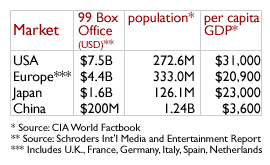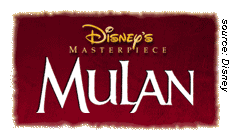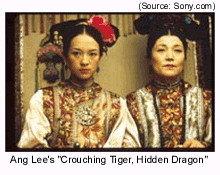|
Hollywood eyes China
|
 |
May 22, 2000: 5:26 p.m. ET
Hollywood waits anxiously for a crack at China's movie audience
By Staff Writer Franklin Paul
|
NEW YORK (CNNfn) - Citizens of Beijing -- brace yourselves for "Beavis and Butthead."
American movie studios are salivating over the potential to entertain mainland China, home to more than one billion people - about one-fifth of the world's population. With U.S. lawmakers set to review the granting to China of favorable trade status, Hollywood is closer than ever to having its most lucrative wish come true.
An affirmative vote in the House of Representatives would give filmmakers outside of mainland China unprecedented access to the Chinese; a culture that the film industry would just love to introduce to buttery popcorn, stadium seating and bankable mega-stars like Julia Roberts, Mel Gibson and Tom Hanks.
 "It's more than a gold mine - it's an untapped diamond mine," said Robert Bucksbaum, president of Reel Source, a Los Angeles-based industry newsletter. "China is by far the most lucrative frontier for the American film market. Once they open the floodgates, the potential and the growth that we will be seeing in the film business will be enormous." "It's more than a gold mine - it's an untapped diamond mine," said Robert Bucksbaum, president of Reel Source, a Los Angeles-based industry newsletter. "China is by far the most lucrative frontier for the American film market. Once they open the floodgates, the potential and the growth that we will be seeing in the film business will be enormous."
In less than a decade, China could balloon to the second-biggest movie market - leapfrogging Europe ($4.4 billion in annual movie ticket sales) and Japan ($1.6 billion) -- from an incidental territory with total yearly box office revenues struggling to hit $200 million. Filmmakers in the United States, where ticket sales topped $7.5 billion last year, can smell the lucrative potential.
"We are going to attack it like any other new market," said Daniel Taylor, chief financial officer of MGM Inc., (MGM: Research, Estimates), one of Hollywood's seven big studios. "No matter how you measure it, you're looking at about more than one billion sets of eyeballs."
Currently, China permits the U.S. film studios -- including Paramount, MGM, Universal, Twentieth Century Fox, Disney, Sony, and Warner Bros. -- to bring in a mere 10 films per year, selected under the scrutiny of the government's culture ministry. Restrictive taxes and conditions shrink the studios' take from the films, even if they are big hits -- annual U.S. entertainment revenues from China now average a meager $20 million. Warner Bros. is owned by Time Warner, the parent of CNNfn.com.
 If Congress approves Permanent Normal Trade Relations, China will double the quota of "revenue-sharing" films - the films for which China splits the box office receipts on a 50-50 basis -- from 10 to 20. China will also allow an additional 20 foreign films per year on flat fee licensing terms. By the third year, the combined film quota will increase from 40 to 50 films. If Congress approves Permanent Normal Trade Relations, China will double the quota of "revenue-sharing" films - the films for which China splits the box office receipts on a 50-50 basis -- from 10 to 20. China will also allow an additional 20 foreign films per year on flat fee licensing terms. By the third year, the combined film quota will increase from 40 to 50 films.
Under the pact, U.S. firms can form joint ventures to distribute videos, software entertainment, and sound recordings and to own and operate cinemas. Hollywood's deep-pocketed studios will be able to invest in China's underdeveloped film distribution system.
Currently, the ratio of screens per person in China is about one screen per 122,000 persons. In contrast, the United States has one screen per 8,600 people.
"Foreign capital to build new cinemas will help modernize China's aging cinema infrastructure, attract Chinese consumers back into cinemas, and increase demand for U.S. films," said Jack Valenti, chairman of the Motion Picture Association of America, in testimony to Congress earlier this year.
Dogged in his pressure on Washington to pass the legislation, Valenti insists that the trade pact will smile on many of the sister industries of the film business, by opening a new export market for U.S. companies that make sound and projection equipment and other furnishings for new cinemas.
If Hollywood builds it, will they come?
Despite Hollywood's conviction -- and considerable muscle -- there are no guarantees that people in China will flock to see U.S. films, even high-budget summer fare such as Disney's $200 million epic "Dinosaur," or Paramount's "Mission Impossible 2."
 True, "Titanic" was a runaway hit in China, but "Star Wars Episode 1: The Phantom Menace," received a lukewarm reception. True, "Titanic" was a runaway hit in China, but "Star Wars Episode 1: The Phantom Menace," received a lukewarm reception.
"The young people are rather interested in watching the American feature films," said Zhang Yuanyuan, an official at the Chinese embassy in Washington. "But over time they found that the nature of all these films is kind of alike. They would like to see more variety of these American movies."
But, he added, "I don't think American movies are all the same -- there are varieties. It is up to the exporters to make the right selections."
Of course, it's not that simple. China's headstrong domestic film industry isn't exactly keen on taking orders from 6,000 miles away. According to Variety magazine, China's film industry leaders will encourage co-productions and consider the creation of Sino-foreign production joint ventures while maintaining the restriction on foreign film distribution in order to gain time to make the Chinese film industry more competitive.
Or they might take a cue from South Korean filmmakers, who at the Cannes Film Festival last week urged the creation of an international coalition to stop Hollywood blockbusters from wiping out local movies.
They called for governments to resist what they said were U.S. attempts to use free trade treaties to expand their reach at the expense of locally made films, and called for quota systems to protect home-grown films in a global market that they said was already 80-90 percent controlled by Hollywood.
"It's hard to see that this is going to be anything but really bad news for the Chinese film industry," said Shelly Kraicer, a Toronto-based specialist in Chinese film. "Forcing the last Asian markets that Hollywood hasn't conquered open to Hollywood product will tend to completely force local product out of the picture."
 What's more, strict content guidelines and cultural differences could dim the outlook on certain American films in China. Mild examples include Disney's animated film "Mulan," which was criticized as an "Americanized" version of China's fairytale action heroine, Hua Mulan. What's more, strict content guidelines and cultural differences could dim the outlook on certain American films in China. Mild examples include Disney's animated film "Mulan," which was criticized as an "Americanized" version of China's fairytale action heroine, Hua Mulan.
The government outright rejected Martin Scorcese's "Kundun," a film that explores China's rule over Tibet and the life of its spiritual leader, the Dalai Lama. Contentions were also raised over "Seven Years in Tibet," and "Red Corner," the 1997 film critical of the Chinese legal system that starred Richard Gere, a celebrity crusader for Tibet.
The government also frowned on films such as, "Apollo 13" and "Air Force One," which celebrated American ingenuity and military might.
Injecting "international flavor"
Changes won't be exclusive to China, experts say. The texture of many mainstream films could change as Hollywood cozies up to a billion new customers.
With expansion in mind, Hollywood may sprinkle more international stars, locales and topics into its product, to pique the interest overseas. Experts say that more films will be built with diverse casts, such as 1998's "Rush Hour," starring Jackie Chan and Chris Tucker, or "Tomorrow Never Dies," the 1997 James Bond film starring Pierce Brosnan and Michelle Yeoh.
"It will have a big effect in the U.S. as well as the Far East, because you are going to be seeing a lot more films with international flavor, instead of geared toward the U.S. and European markets," said Reel Source's Robert Bucksbaum.
"I'd say that one in every four productions will be geared toward the Asian market - if China opens the floodgates," he added.
Zhang of the Chinese Embassy was optimistic that the open trade agreement would stimulate Americans' appetite for Chinese films, and actors such as Yeoh, whose elegant good looks and killer high kick have made her one of the most popular martial arts stars in Asian film.
"People here [in America] are interested in seeing more Chinese movies," said Zhang, who cited critical acclaim for the recently released film "Not One Less," by noted director Zhang Yimou.
 Indeed, one of the most buzzworthy films at this year's Cannes festival is "Crouching Tiger, Hidden Dragon," a feminist, martial arts, epic love story set in a mythical China, directed by Taiwanese-born Ang Lee, and starring Yeoh and Chow Yun Fat. Indeed, one of the most buzzworthy films at this year's Cannes festival is "Crouching Tiger, Hidden Dragon," a feminist, martial arts, epic love story set in a mythical China, directed by Taiwanese-born Ang Lee, and starring Yeoh and Chow Yun Fat.
Smaller films might also get a crack at U.S. moviegoers, Shelly Kraicer suggests. One such film might be "Spicy Love Soup," a nationwide hit in China that was directed by Zhang Yang, and produced by Peter Loehr, an American.
"I'm sure over time it will have a mutual effect or influence with the movie industry people in both countries. It is advisable for the movie industry of both countries to compare notes to compete even and to prosper," said Zhang of the Chinese embassy.
Overcoming Piracy
Even if the legislation passes, American film studios will probably tread lightly until they become comfortable with China's huge problem with piracy, the illegal reproduction and distribution of film and other entertainment products.
MPAA's Valenti said Chinese policy makers officially recognize the problem. "Serious efforts are underway to try to bring the domestic problems under control," he said.
Zhang concurred. "The Chinese government has a strong resolve and determination to crack down on pirating. This allows greater access to legitimate business rather than movies coming from a back door." 
|
|
|
|
|
 |

|

